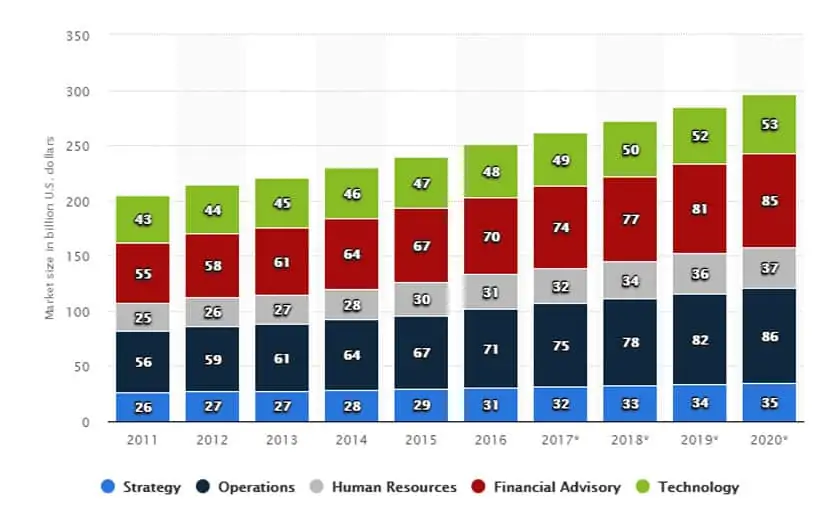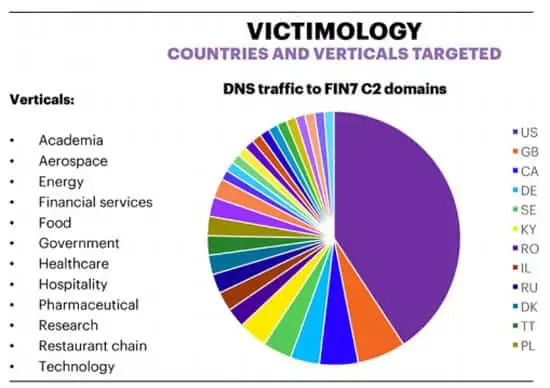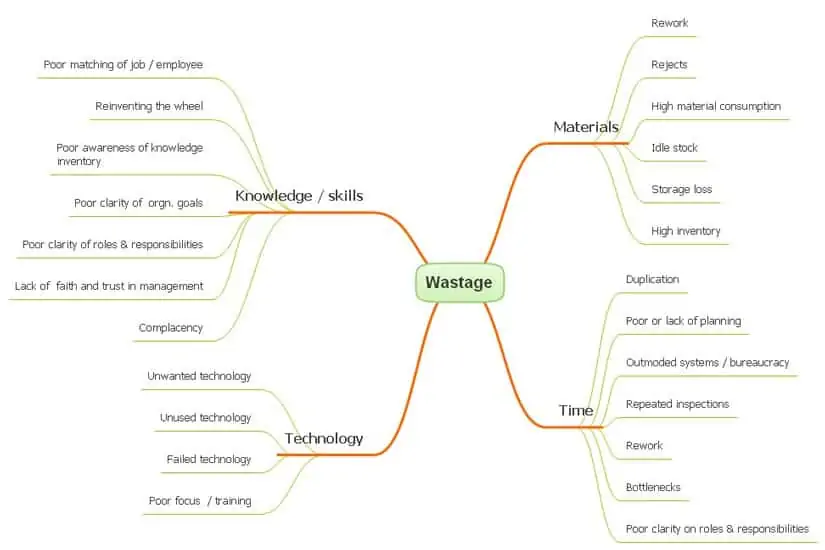
In the history of commerce, there’s never been a business that didn’t have its fair share of operational issues.
And, as is often the case, the bigger the business, the more issues there are.
Most enterprises recognize that there’s plenty amiss within their operations, whether it’s their cashflow mismanagement, regulatory compliance shortfalls, performance issues, corporate waste, or the myriad of other business-busting-burdens. But often times, enterprises lack the objectivity (and processes) to address these issues internally.
So many of them do what big businesses have always done. They pay someone else to figure it out.
Or they risk collapsing under their own weight.
So it’s no surprise, then, that the consulting industry is booming.
The consulting market has nearly doubled in size in a mere decade, with most of its growth coming from operations and financial services. And that’s telling. Corporations seem to have no shortage of financial and operational holes to plug — with a dozen consultants on retainer for every type of issue they’ve identified.
Yet for every issue, your business has identified (and hired consultants to address), there’s bound to be three that slipped under your radar.
So here’s a comprehensive list of 12 disastrous operational issues that might cost your business millions if you don’t fix them.
1. Performance Monitoring
At the start, you must set clear goals and expectations for how your business performs, and this isn’t as simple as just going off of financial indicators. You must set meaningful KPIs that give clear insight into what it means for your business to succeed, and those KPIs shouldn’t be a long list of all of everything you can measure.
Most mature businesses have quarterly financial targets, some marketing goals, and a handful of disconnected KPIs. But when you have dozens or even hundreds of teams working on different projects, you need comprehensive performance monitoring at every level of your operation.
Aligning employees to disconnected KPIs they can’t directly contribute to (like corporate financial targets) is an immense mismanagement of your human resources.
Without monitoring performance on a team or individual level, employees can be lost in the dark, unsure of how their hard work is impacting the business as a whole. This can lead to disengagement from employees, and on a grander scale, can lead to wrong decisions being made due to a lack of performance indicators.
2. Cash Flow
Imagine this scenario: your business is a major player in your industry, you’ve become a household name, you exceed your revenue targets on a regular basis, and have incredible partnerships with the biggest companies in your space…
But because of poor cash flow management, your most recent round of financing falls through and suddenly you can’t afford to pay your employees for even a single day of work. Now you must layoff hundreds or even thousands – of staff without notice, essentially destroying your business.
While every business situation is different, mismanagement of cash-flow is a leading cause of failure and bankruptcy.
3. Managing Overheads
Overhead costs – such as administrative expenses, rent, property taxes, utility costs, etc. – fall under the same group as cash flow; if mismanaged and not fixed in a timely manner, this could mean the end of your business.
To fix this particular issue, you’ll need a complete picture of your total expenses to determine what are unnecessary and discover any potential problems.
Not everyone is a finance guru, and many find themselves struggling to manage the abundance of overhead costs. This is why it takes the right collective – the Chief Financial Officer (CFO) and team – who can ensure your financial stability.
4. Cyber Security Risks
We’ve all read the headlines: “[Company Name] suffers major hack, millions of customers’ data exposed”.
According to an Accenture report, 71% of Chief Information Security Officers (CISO) said that cyber attacks are still a “bit of a black box; we do not quite know how or when they will affect our organization.”
Every business, in every industry, in every corner of the world must be prepared for a variety of cyber hacks that could come in the form of ransomware, phishing, and DoS attacks (just to name a few).
5. Regulation and Compliance
You must be aware of every intricate regulation and compliance standard that impacts the industry you operate in. If not, you risk tough financial consequences from fines.
Consider the GDPR regulations put into effect by the European Union. According to Inc., 52% of companies in the U.S. are not prepared for these new data regulations and could face fines. In fact, GDPR lawsuits are already targeting the likes of Google, Facebook, Apple, and Amazon.
Google and Facebook alone faced $9.3 billion in fines just after the first day of GDPR.
To effectively operate within the regulation and compliance limits of your industry, you may want to consider the help of a third-party consultant.
“All the rules and regulations since the financial crisis makes us need to be very quick in our adoption and interpretation. It doesn’t give us a lot of time to react. Because there are so many people that need to be informed, appropriate and relevant awareness and education programs are critical. We need to make sure that each of our employees is fully aware of their roles and responsibilities, as well as the ethical repercussions that are associated with these rules. That creates a challenge to ensure that we have proper business practices around each product that we launch so we fully address the client’s needs and don’t end up on the wrong side of regulatory surveillance.” – Fenton Aylmer, operational risk management lead for business practices and conduct, Citi, to Risk.net.
6. Uncontrolled Expansion and Short-Term Mindset
To no surprise, strategy plays a big role in discerning any operational issues in your business. It can be easy for fast-growing businesses to be caught unprepared, leading to uncontrolled expansion that ultimately costs time, money, and resources.
While there is no perfect business plan, and you’re bound to evolve your vision as you grow, it is important to stick to your long-term goals.
Operating with a short-term mindset could leave you pressured to rapidly hire staff with few or non-existent training processes, or force you to redesign workflows on the fly to accommodate demand. This is akin to putting a bandaid on a bullet wound.
Learn How You Can Avoid Issues and Get Operational Insight
7. Building the Right Team
Your team is paramount to business success. Hiring the right people with the skills and competencies that are right for your team is absolutely necessary to ensure long-term growth.
This requires you to look at your management style. You must be aware of how your staff works best; for instance, that might mean highly collaborative teams for some or more siloed work for others.
A lot goes into ensuring that your team is happy and therefore working at optimal capacity. Otherwise, you might be staffing your business with employees who feel underutilized, overworked, and ready to jump ship.
8. Lack of Feedback
As a growing business, you must rely on feedback from your client base. If a product or service is not accomplishing what it should, extensive conversation with your customers can help put your business back on the right path.
Any lack of feedback can be dangerous to your business. Without feedback, you are operating in the dark, moving forward with business plans based on inaccurate assumptions.
9. Wastage
Wastage is the collective sum of a combination of issues, primarily in the areas of technology, materials, time, and knowledge. On an individual level, problems around a single issue may fly under the radar, completely ignored or unnoticeable.
While on an individual level, these problems are unlikely to have deep repercussions on your business. However, when taken collectively, you may discover that you have too many problems to solve.
10. Technology Problems
There’s a popular saying that in the digital age, ‘every company is a technology company.’ No matter the industry or type of business, leveraging technology to get ahead of your competitors is vital for success.
Similar to cyber attacks, any technical problems your business experiences can be disastrous. However, because of the nature of these problems, they can be prepared for, and are a little more manageable.
For example, if you are leveraging cloud computing, you must prepare for worst-case scenarios like outages from your cloud provider.
“[The impact of IT failure] can be big, not just in terms of direct losses but also indirect losses, like losing a lot of customers. Many banks, not in Europe but in Asia, are already talking about cloud solution storing. I can’t assess right now how [disruptions] might affect the business, but I think in terms of mobility of clients, this could be severe.” – Head of Operational Risk at a European bank to Risk.net.
11. Too Much Data
At our current pace of development, there are 2.5 quintillion bytes of data created every day. This is only going to accelerate further as the Internet of Things devices become standard throughout various industries.
You collect exuberant amounts of data daily across all aspects of your business. By not taking advantage of this valuable information, you are leaving opportunities for both near and long-term success on the table.
To take advantage of your data, it may be beneficial to partner with a consultant who can give you deep insights into your business.
Learn More About Operational Issues in Your Industry:
- Gut Decisions: If they are giving you indigestion, it may be due to the data you chew on
- Top 5 Reasons Mining Projects Never Get Off the Ground
- The Most Important Operational Insights to Have on Your Mine
12. Second to the Competition
While growing your business, it can be easy to find yourself with blinders on. After all, you’ve been focusing so directly on your own operations, you have forgotten to pay attention to your competitors.
To truly avoid disaster, you must analyze your direct competitors to learn what your business can do better.
Ask yourself, what service can you provide to your client-base that they can’t get anywhere else? And if they can, why should they choose you?
For nearly a decade, MOSIMTEC has provided business simulation model solutions to complex operational issues. We understand that it can be difficult to gain the insights you need for business success. Contact us today to learn how we can provide the tools you need for operational insight for your business.
Avoid Stalling Operations With Expert Simulation And Predictive Modeling



